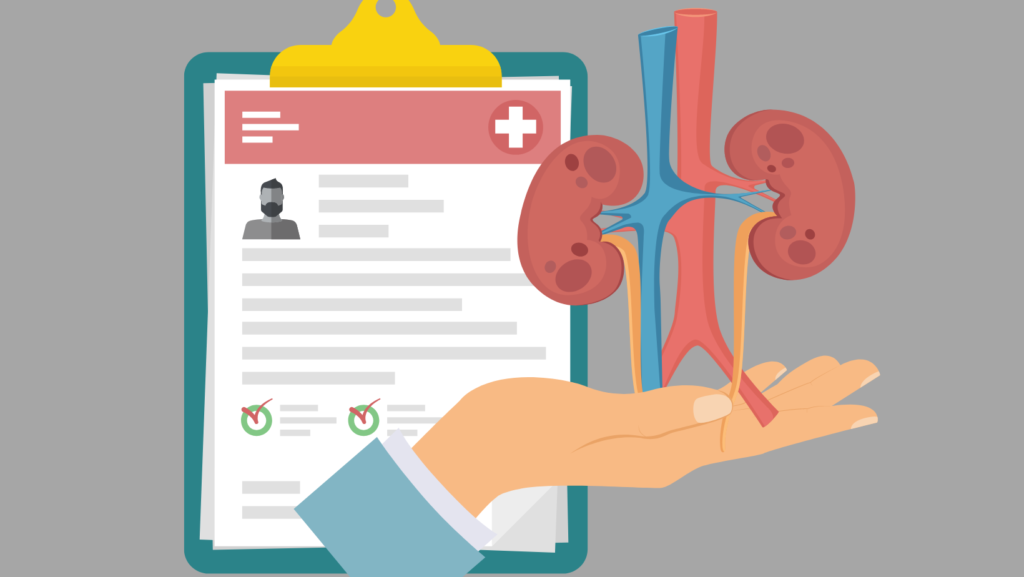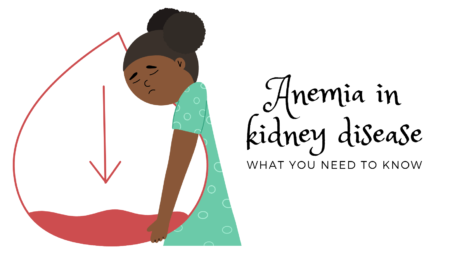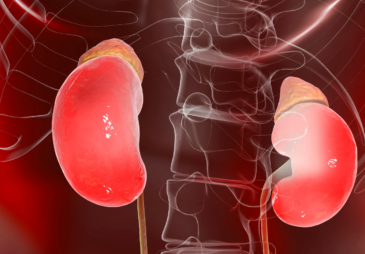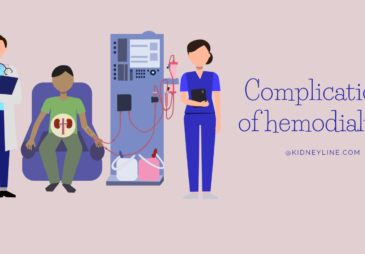Anemia is when a person does not have enough red blood cells to carry oxygen to the body organs. It is a common complication in patients with chronic kidney disease (CKD). Unfortunately, anemia in kidney disease is associated with a decreased quality of life.
How are red blood cells produced?
The bone marrow produces red blood cells. To produce red blood cells, the bone marrow needs the activity of a hormone called erythropoietin (EPO) produced by the kidneys. Besides erythropoietin, the bone marrow needs iron, folic acid, vitamin B and proteins to produce red blood cells.
Causes of Anemia in Kidney Disease
Anemia is a common complication of kidney disease. It is more common in those with severe disease. For example, in a study of US adults with CKD, 8.4% of those with stage 1 CKD had anemia. In contrast, 53.4% of those with stage 5 CKD had anemia.
Here are some causes of anemia in CKD.
Reduced Production of Erythropoietin
In CKD, the kidneys are damaged and may not produce enough EPO. Recall that EPO stimulates the bone marrow to produce red blood cells. As such, CKD can lead to a decrease in the production of red blood cells and cause anemia.
Iron Deficiency
Hemoglobin is the oxygen-carrying pigment in red blood cells. It comprises heme (composed of iron) and globin ( composed of protein). In kidney disease, iron stores may deplete due to blood loss during dialysis, inflammation, or decreased absorption of iron from the diet. Unfortunately, the body cannot produce enough hemoglobin or red blood cells when iron is deficient.
Chronic Inflammation
Chronic inflammation is common in kidney disease and can contribute to anemia. In addition, inflammation can interfere with the production and activity of EPO, reduce the lifespan of red blood cells, and impair iron metabolism.
Medications
Some medications used to treat CKD, such as ACE inhibitors and angiotensin receptor blockers (ARBs), can cause anemia as a side effect. These medications may reduce the production of EPO or the ability of the bone marrow to respond to EPO.
Blood Loss
Patients with kidney disease may experience blood loss due to frequent blood tests, surgeries, or gastrointestinal bleeding. This can lead to iron deficiency and anemia.
Nutritional deficiencies
People with CKD may find it challenging to eat. As a result, some of them have deficiencies of vitamins and minerals like folate and Vitamin B12, necessary for red blood cell production.
Reduced life span of red blood cells
CKD causes build-up of toxins in the body. These toxins may make the red blood cells fragile so that they have a reduced lifespan.
Symptoms of Anemia
The symptoms of anemia in kidney disease can vary depending on the severity of the condition. Some of the most common symptoms include:
- Fatigue and weakness
- Shortness of breath
- Palpitations
- Dizziness or lightheadedness
- Headaches
- Cold hands and feet
- Pale skin
- Chest pain
In addition to these symptoms, anemia can also cause other complications in people with kidney disease. For example, it can lead to heart problems, including an enlarged heart and heart failure, as well as cognitive impairment and depression.
If you have kidney disease, it’s essential to be aware of the symptoms of anemia and to talk to your doctor if you’re experiencing any of them. Your doctor can perform blood tests to determine if you have anemia and can recommend appropriate treatment options, which may include medications or blood transfusions.

Diagnosis of Anemia in Kidney Disease
The first step is a complete blood count (CBC) to check hemoglobin, hematocrit, and red blood cell levels. If the results show low hemoglobin and hematocrit levels, further testing may be necessary to determine the cause.
Tests for iron deficiencies are frequently requested. This is because iron deficiency is prevalent among people who have anemia in CKD.
Although erythropoietin is linked to anemia in kidney disease, it is not typical for doctors to check your erythropoietin levels.
Sometimes, a bone marrow biopsy may be necessary to rule out other conditions that can cause anemia. This involves taking a small sample of bone marrow from the hip or breastbone and examining it under a microscope. Your doctors may request this if they are uncertain of the cause of your anemia.
Other tests that may be done include vitamin B12 and folate levels to rule out deficiencies. A reticulocyte count is useful in determining if the bone marrow is producing enough red blood cells.
Overall, a thorough evaluation by a healthcare provider is necessary to accurately diagnose anemia in kidney disease and determine the underlying cause.
Treatment of Anemia in Kidney Disease
One of the most common treatments for anemia in kidney disease is EPO-stimulating agents (ESAs). These medications work by stimulating the production of red blood cells in the bone marrow. ESAs are typically administered by injection and can be given intravenously or subcutaneously. ESA dosage varies depending on the severity of the anemia and response to the medication.
Some side effects of ESAs are hypertension and cardiovascular events. Therefore, it is important to keep up with your follow-up visits with your healthcare team.
In addition to ESAs, iron supplementation may be necessary to address iron deficiency anemia in patients with kidney disease. In some cases, iron supplementation is enough to correct anemia. But some other people need iron and ESA. For people with iron deficiency, giving ESAs alone won’t work. This is because the bone marrow needs iron to produce red blood cells.
In my clinical practice, if a person has iron deficiency, I would typically give iron first. As mentioned earlier, some would respond to this. If the person remains unresponsive, I add an ESA to iron supplementation.
Other treatments for anemia in kidney disease may include blood transfusions, particularly in cases where the anemia is severe, and the patient is experiencing symptoms such as shortness of breath or fatigue. For people who hope to receive a kidney transplant, it is critical to avoid frequent blood transfusions as this is associated with kidney rejection on transplantation. ESAs and iron are effective in building up blood levels without the need to transfuse.
It is important to work closely with your healthcare providers for effective management. Treatment may be adjusted over time depending on your response to therapy and changes in your kidney function or overall health status.
Prevention of Anemia in Kidney Disease
Primary causes of anemia in kidney disease are deficiency EPO and iron deficiency. Therefore, EPO and iron replacement therapies are the mainstay of anemia treatment in kidney disease.
In addition to EPO and iron, there are several strategies that can help prevent anemia in kidney disease:
- Managing underlying kidney disease: Treating the underlying cause of kidney disease, such as diabetes or high blood pressure, can help slow the progression of kidney damage and reduce the risk of anemia.
- Dietary changes: Eating a balanced diet rich in vitamin B12 and folate can help support the production of red blood cells. Foods such as red meat, poultry, fish, eggs, leafy green vegetables, and fortified cereals are good sources of these nutrients.
- Supplements: In some cases, supplements such as iron, vitamin B12, and folate may be prescribed to help prevent anemia.
Overall, preventing anemia in kidney disease requires a multi-faceted approach that includes managing underlying kidney disease, maintaining a healthy diet, and using appropriate medical interventions such as EPO replacement therapy and supplements.
If you have CKD taking these steps can reduce the risk of anemia and improve your overall health.
Disclaimer:
The information provided here is for educational purposes only. Please work with your healthcare team for any concerns and medical issues.




